LMU Newsroom – The year in review
30 Dec 2024
A quick look back at the topics that especially interested LMU News readers in the course of 2024.
30 Dec 2024
A quick look back at the topics that especially interested LMU News readers in the course of 2024.
The LMU Newsroom provides a constant stream of fresh insights into research and study at LMU. The following review rounds up those issues that have especially touched and fascinated our readers over the past twelve months.
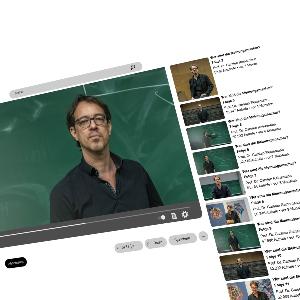
proposes the continuous monitoring of opinion power, irrespective of the quality of the sources. | © LMU
Communication researcher Professor Carsten Reinemann investigates how people form opinions and what YouTube, TikTok et al have done to change this process. At the start of 2024, the LMU Newsroom posted an interview with Professor Reinemann that a very large number of readers clearly found riveting. In this interview, the LMU communication scientist explained how social media affects the formation of opinions. He also discussed research questions that he was pursuing in an ongoing project:
“In the past, the traditional media had a virtual monopoly, especially in the journalistic field. This monopoly is now being broken up, which has both positive and problematic aspects. On the one hand, we can speak of a democratization of public communication. On the other hand, there are challenges such as disinformation, misinformation and hate speech. The question we are asking ourselves as part of the project is how and by whom power of opinion is exercised in these new channels. We want to understand how many people are reached by media they trust and how these media ultimately affect people.”
For the interview, see: Who are the influencers?
We want to understand how many people are reached by media they trust and how these media ultimately affect people.Prof. Dr. Carsten Reinemann, Professor for communication science with a focus on political communication
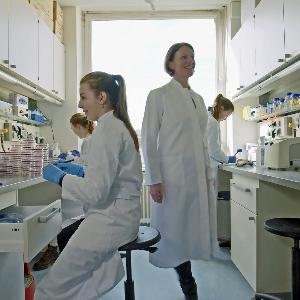
is keen to get young people interested in an academic career. The freedom to conduct research and the associated flexibility mean that is certainly possible to achieve a healthy balance between family and one’s career. | © LMU
“An academic career is a good decision for anyone who is curious,” says Bärbel Stecher. The Professor of Medical Microbiology and Hygiene at LMU’s Max von Pettenkofer Institute researches the microbiome of the gut, investigating its role in human health and how it guards against infection.
To coincide with Women and Girls in Science Day – a topic that every year generates a wealth of posts on social media – the LMU researcher recorded a video documenting how she herself got started on an academic career: “My interest in life in general, in its diversity, my desire to better understand how these organisms work, that is what prompted me to study biology.” In LinkedIn, for example, the video drew lots of comments and sparked off a discussion among the readers.
For the video, see: „An academic career is a good decision for anyone who is curious“
As a professor, I have a very varied working day.Prof. Dr. Bärbel Stecher, Professor of Medical Microbiology and Hygiene at LMU’s Max von Pettenkofer Institute

The behavior of caregivers is critical to a child’s ability to feel concern for others. | © IMAGO / Westend61
In March, a developmental psychology study was picked up by many media and also stoked up considerable interest in the Newsroom. A team working with Professor Markus Paulus had studied how concern for others emerges in children. The findings triggered vigorous debate on the English-language channel reddit.
Children already show concern for others at 18 months. In an LMU study, the facial expressions, gestures and vocalizations of children at this age indicated they were emotionally affected by the distress of another person. From a psychological standpoint, this is an important developmental step. “To experience empathic concern, the child must be able to distinguish between the self and the other person,” Markus Paulus says.
Infants are moved by the feelings of others, such as fear or grief, from an early age. Developmental psychology interprets this emotional contagion as a first step toward empathic concern. “For empathic concern, you also have to be able to regulate the emotion and not be overwhelmed by it,” Paulus explains. Empathic concern thus requires not only affective resonance, but also cognitive understanding and the ability to take the perspective of the other person.
For the release, see:
MConcern for others emerges during second year of life
Discussion on reddit: Empathy begins in infancy
A child couldn’t survive without sensitive caregivers who act with empathic concern. Children learn from them how to deal with negative emotions. As a result, they are subsequently able to apply these lessons themselves.Prof. Dr. Markus Paulus, Chair of Developmental Psychology and Educational Psychology at LMU
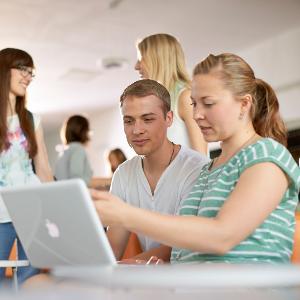
There are all kinds of ways to play an active part in the university environment – as a student representative, for example, or in the context of groups organized by students. | © Jan Greune (LMU)
At the start of the summer semester, an article about student volunteering was very well received. It showed that there are many and varied reasons why people take on such responsibilities. For example, quite a few students who volunteer come from working-class homes and have had to struggle to make it to college. So they in turn seek to help schoolchildren from non-academic backgrounds in finding their way to university.
Others were seriously ill as youngsters and want to express gratitude and give something back to society by volunteering on behalf of sick children. Many refugees, too, are socially engaged and help students in their home country gain access to knowledge or help their compatriots in Germany with things like legal aid and translations. Others volunteer for homeless people, give free tutoring in refugee centers or look after their grandparents alongside their studies.
“Engagement is fundamental to an academic education, as it is a constituent part of being human,” says LMU Vice President Professor Oliver Jahraus. “Training in the natural sciences, for example, is driven by scientific curiosity and rigor. However, it also comes with the awareness that science does not take place in a vacuum, but occurs in a social context for which we assume responsibility – and do so specifically through and from within science.”
For the article, see: Making the world that much better
I’m a big fan of doing something in a team and pooling abilities. We need people who don’t just talk but get things done.Paula Hofmann, Youmocracy
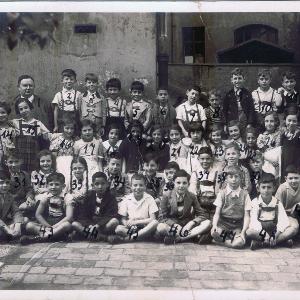
The children of the Jewish School in Herzog-Rudolf-Strasse in 1937. | © Privatnachlass Karl Süßheim, Margot Suesheim (†), New York, und Familie; Image on the LMU homepage: Familienpapiere Sara Hinde Rosenstock
In May, readers were deeply moved by an article about one very special study project: Researchers and students at LMU had traced the fates of children from the Jewish Public Elementary School in Munich. Their research was inspired by a class photo from 1937, recovered from the estate of orientalist and LMU Professor Karl Süssheim.
In the course of the research project, it became clear that eleven of the 47 classmates of Süssheim’s daughter Margot, with whom she went to school on Herzog Rudolf Strasse and who look into the camera with smiles or curious or expectant expressions on their faces, did not get to live their lives. They and their teacher Ferdinand Kissinger – great-uncle of subsequent US Secretary of State Henry Kissinger – were murdered by the National Socialists.
For the article, see: What became of them? Children of the Jewish School in Munich
They were normal children – children just like we used to be. The dreadful circumstances of their lives and the things they had to go through are harrowing.Derek Lesho, Student
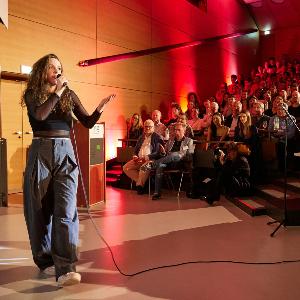
With her rapped slam contribution accompanied by her own music, Maren Rothkegel won the MUG Slam in summer 2024 in the category “Freestyle”. | © LMU / Stephan Höck
Many researchers at LMU frequently compete in science slams, presenting their work to a broad audience in a relaxed, entertaining fashion. In June, some of them talked to the Newsroom about what motivates their involvement and what they have experienced to date. Some, like Maren Rothkegel, want to raise awareness of their given topic: The medical student is conducting research into endometriosis. Others simply want to arouse a general interest in science, or to draw the attention of girls in particular to the possibility of embarking on an academic career.
In the summer, LMU’s GraduateCenter der LMU GraduateCenter organized a science slam specially for doctoral candidates. Each contestant had just 180 seconds to present their research. “We thought that a Science Slam would be an ideal way of helping PhD candidates develop the skills they need,” says Florina Kniffka, who organized the slam.
For the article, see: Why do you slam?
Science communication does not have to be difficult to understand and full of academic jargon, but can take the form of a rap, a slam, or a dance.Maren Rothkegel, medical student
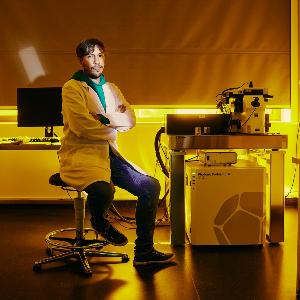
In his search for novel nanomaterials that can be used for sustainable energy production, Emiliano Cortés is experimenting with supercrystals made of tiny gold spheres that can efficiently capture sunlight. | © LMU/Florian Generotzky
LMU physicist Emiliano Cortésdevelops novel, clever materials to generate sustainable energy and replace fossil sources like oil and gas. "I very much hope that my work can contribute to solving the global challenges of the climate crisis," says the LMU physicist. Cortés heads up LMU’s Nanomaterials for Energy research group, which now has a staff of over 20 people from around the world and is part of the e-Conversion Cluster of Excellence. Generally speaking, everything the team does revolves around nanomaterials: ones that can be used for sustainable and efficient energy production and storage, as well as ones which use light energy to stimulate certain chemical reactions. For example, some of the researchers in the group are hunting for materials that can remove CO2 from the atmosphere. “Reducing greenhouse gas emissions alone will not be enough to stop climate change,” says Cortés. “There is already too much of it in the atmosphere.”
LMU Newsroom reports on Cortés’s research consistently elicit considerable interest, even in the English versions published for international readers.
For the article, see: The cathcher of light
I very much hope that my work can contribute to solving the global challenges of the climate crisis.Prof. Dr. Emiliano Cortés, Professor of Experimental Physics at LMU
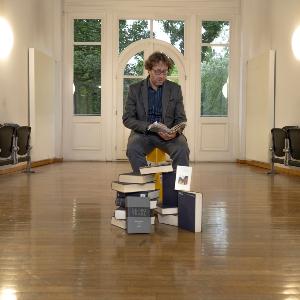
“In my teaching, I try to convey a sense that much of the material that students have positive and productive dealings with is in fact poetry, although they are not even aware of the fact,“ says Frieder von Ammon. | © LMU
Verses that stick in the mind: An interview with literary scholar Frieder von Ammon, Chair of Modern German Literature (majoring on 20th-century and classical modernist literature) on the ubiquity and timelessness of poetry. Published in the Newsroom at the end of July, this interview drew numerous plaudits in the weeks that followed. One reason was that many people evidently use search engines to learn about poetry online.
The literary scholar extends an invitation to read poems written by women: “For a long time, the canon of poetry was administered exclusively by men, and that obviously leaves traces. But there are outstanding poems by women from past centuries, many of which are scarcely known – for example because they were not included in the anthologies. In some cases, you still have to consciously go looking for them. Fortunately, the ratio of female to male poets is more balanced in the present day. But there is still a lot to do.”
For the interview, see: "Poems can change lives“
Poems can achieve a tremendous amount. They can change lives, open up insights, create a sense of community, convey secret messages, challenge rulers, make scholars’ head spin, be sung joyfully.Prof. Dr. Frieder von Ammon, Chair of Modern German Literature
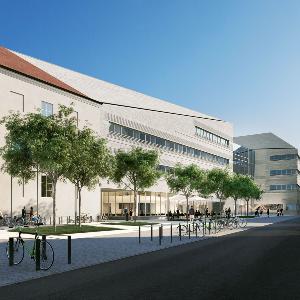
Rendering of the new building in Munich. | © Visualisierung: Gerber Architekten
The groundbreaking ceremony for the new Geo-Campus on Munich’s Schillerstrasse took place on 24 September 2024. In the future, LMU’s geoscientific work across five teaching and research units – geology, paleontology and geobiology, mineralogy and petrology, crystallography, and geophysics – will be united under one roof. Moreover, the Bavarian state collections for mineralogy and for paleontology and geology are also moving into the new building.
One striking new feature is the “Geoforum”, whose aim is to deliver a hands-on experience of geoscience – for visitors, but also for students and academics. In addition, the forum is designed to give people a behind-the-scenes peek at modern research and study, complete with exhibitions, interactive workshops, guided tours and lectures.
In an interview with the LMU Newsroom, the two geoscientists Donald Dingwell and Yan Lavallée spelled out the importance of the new LMU building and discussed the global challenges facing their discipline.
For the interview, see: Geocampus: Innovative laboratories, new synergies
The idea was also to give people glimpses behind the scenes of research.Prof. Dr. Donald Dingwell, Director of the Department of Earth and Environmental Sciences
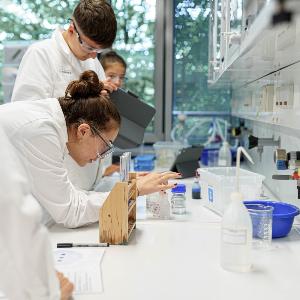
Pupils conduct experiments in LMUchemlab | © LMU
In Professor Silvija Markic's LMUchemlab, pupils can experience chemistry in an inclusive environment.
Silvija Markic conducts research into linguistic heterogeneity and cultural diversity in chemistry lessons as well as the learning and teaching of technical languages at schools and universities. Together with her doctoral students, such as Jannis Memmen, she supervises the LMUchemlab, the Chemistry Department's learning laboratory. Here, students can experiment independently in a supervised environment – without time pressure and in a manner adapted to their individual learning needs.
“The LMUchemlab has the concept that we want to reach all students, regardless of their language skills, cultural background or socioeconomic status,” Markic says.
For the video, see: Understanding chemistry
The LMUchemlab has the concept that we want to reach all students. Regardless of their language skills, cultural background or socio-economic status.Prof. Dr. Silvija Markic, Professor for the didactics of chemistry

Climate change will bring more extreme weather events – including droughts. | © IMAGO/Depositphotos
What needs to happen to stop global warming? LMU researchers across various disciplines address the most pressing questions about climate change and the associated challenges. To coincide with the United Nations Climate Change Conference that took place in Baku from 11 to 12 November, these scientists explained what steps are needed – from protecting coral reefs to adapting to extreme weather events.
“Swift and massive expansion of climate action measures is vital if we’re to reach our targets under the Paris Agreement,” says LMU geographer Julia Pongratz. “If countries do not quickly become much more ambitious, the world will be on course for a temperature rise of 2.6 to 3.1°C.”
For the article, see: “It is up to us“
The frequency and intensity of extreme events – sadly, very topical now in France and Spain – underscores how we in Germany also need to prepare for greater and new risks.Ralf Ludwig, Professor for Applied Physical Geography and Environmental Modeling at LMU

© This image was created with the help of ChatGPT
At the end of the year, LMU researchers provided insights on the use and limitations of the technology in medicine, business, and society. Scientists from various disciplines across LMU shed some light on different issues, e.g. AI explainability and data quality
“Thanks to artificial intelligence (AI), we are now on the cusp of the 4th Industrial Revolution — our entire society can expect to see radical change in the next five to ten years. If we are to remain in control of this rapid development, we need to have a fundamental, i.e. mathematical, understanding of AI systems," says Gitta Kutyniok, Chair of Mathematical Foundations of Artificial Intelligence.
For the article, see: What AI can really do
The great risk is failing to seize the opportunities from AI technology.Prof. Dr. Stefan Feuerriegel, Head of the Institute of Artificial Intelligence (AI) in Management